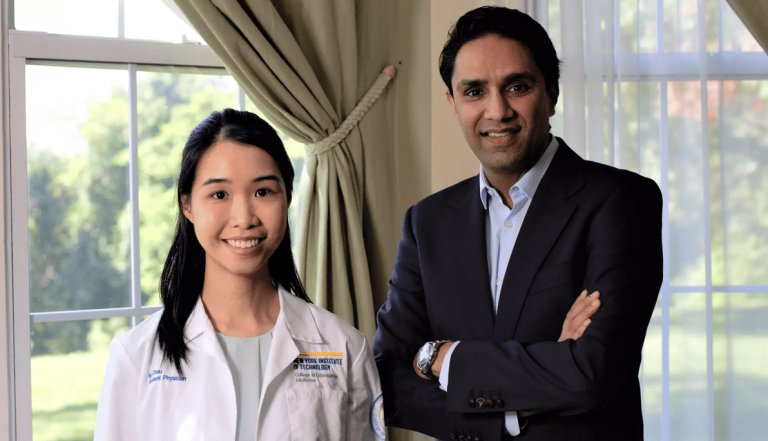
New York Institute of Technology College of Osteopathic Medicine and St. Francis Hospital and Heart Center’s DeMatteis Center for Cardiac Research and Education have launched a research collaboration that could improve the health of Long Islanders and patients around the world.
The new initiative provides NYITCOM students the prestigious opportunity to join St. Francis Hospital’s world-renowned, innovative cardiovascular research that could have life-saving implications.
Each academic year, second- and third-year medical students (selected by NYITCOM) will have the opportunity to apply for a competitive, year-long, mentored research program in which they shadow cardiovascular researchers from St. Francis Hospital, one of the highest enrollers of randomized clinical trials in the United States.
The research experience will take place at the DeMatteis Cardiovascular Institute and St. Francis Hospital & Heart Center in Roslyn. It will allow future physicians to witness medical discoveries firsthand, gaining potentially life-saving insights that could benefit patients in the short and long term.
In addition, medical students will take part in the investigative research process from start to finish, acquiring the necessary understanding to one day conduct their own future studies and clinical trials.
The relationship also furthers the medical school’s existing relationship with Catholic Health, whose facilities serve as a vital training ground for NYITCOM students completing clinical rotations and graduates fulfilling residencies and fellowships.
“Research is absolutely critical to medical education,” says NYITCOM Dean Nicole Wadsworth. “Physicians with medical research experience are better positioned to provide top-notch care and allow patients to make the most informed health decisions possible. With this new collaboration, our students will be engaged in comprehensive research protocol-from collecting data to providing outcomes. In gaining a deeper understanding of the scientific process, these future physicians will be well equipped to critically review medical literature and determine what is in the best interest of their patients.”
According to Dr. Ziad Ali, the director of the DeMatteis Cardiovascular Institute and board-certified cardiologist, establishing the academic relationship was an obvious choice. Not only are the DeMatteis Center and New York Institute of Technology campuses located directly across the street from one another on Northern Boulevard, but researchers at both institutions are working to advance medical innovation.
“Both geography and mission played a key role,” says Ali. “Traditionally, we have had many seasoned practitioners and researchers, but we realized that we needed a more layered approach. Just like sports-where there are the major leagues and minor leagues-medical research also needs a feeder system. Now, we are developing a culture where we train future academicians. NYITCOM students are dedicating themselves to a year of research where they learn, in detail, the scientific method, including how to collect, interpret, and analyze data and how to ask critical questions-all of which come together in moving our field forward.”
The program’s first NYITCOM research scholar, Karen Chau, is assisting Ali in a cardiac imaging study that visualizes coronary artery calcification, the buildup of calcium salts (plaque) in the arteries that deliver blood to the heart. The condition is associated with poor outcomes in heart disease patients.
To further complicate matters, measuring calcium plaque buildup can be challenging, as diagnostic imaging technologies can vary in resolution, level of invasiveness, and ability to assess different types of plaque. Therefore, calcium plaque measurements can differ based on the imaging technology used.
For example, coronary angiography is an imaging technique in which contrast dye is inserted intravenously, allowing blood vessels to show more visibly on CT images. However, the CT beam that helps to capture the images can create artificial shadows that could lead to overestimated volumes.
Under Ali’s mentorship, Chau is analyzing calcium plaque formation and comparing the measurements collected by various diagnostic imaging techniques. The findings could help to inform future cardiovascular research, including an upcoming clinical trial that will examine potential abnormalities, like calcium plaque, in the blood vessels used for coronary artery bypass grafts.
These surgical procedures, which are conducted when major arteries near the heart are clogged or narrowed, involve relocating healthy vessels from other parts of the body (often the leg) to divert blood flow around obstructed arteries and ensure that the heart receives its necessary supply.
Chau, who aspires to pursue a career as a pediatric cardiologist, notes that her research experience will prove invaluable to her future career in medicine.
“The skills that I gain during this research year will allow me to understand how clinical trials are developed, carried out, and analyzed. I can take these skills with me as a future physician to plan other trials that can help us better understand diseases and treatment,” said Chau.






